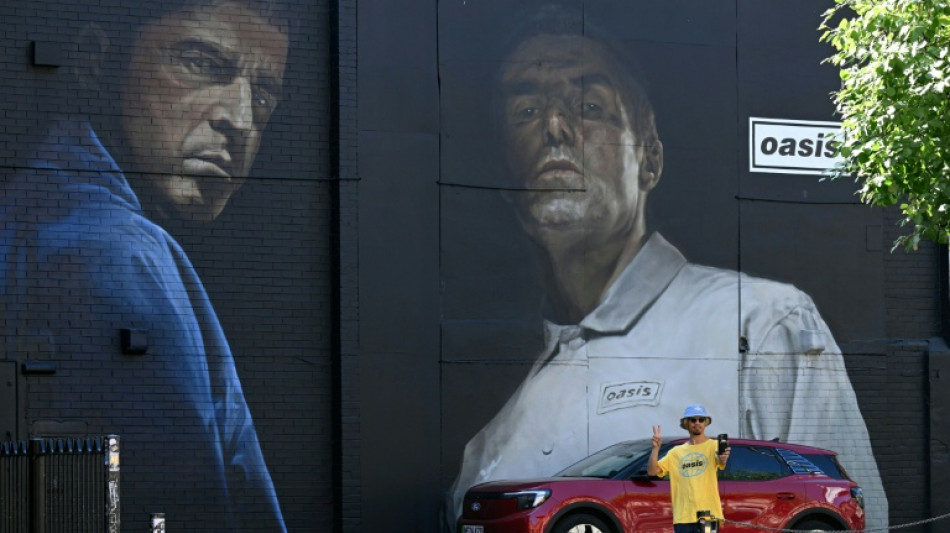

Oasis return reminds world of when Manchester captured cultural zeitgeist
The return of the prodigal Oasis brothers to Manchester on Friday -- on the second leg of their highly anticipated reunion tour -- has rekindled memories of the city's time as a cultural epicentre.
Returning to their roots for five sold-out shows at the northwestern English city's Heaton Park, the famous brothers have definitely created "a buzz around the place", said Susan O'Shea, music expert and senior lecturer in sociology at Manchester Metropolitan University.
The 1990s were a cultural high point for Manchester, when Oasis ruled the airwaves, following in the footsteps of the city's other musical giants.
Bands such as Joy Division and The Smiths all paved Oasis's path to greatness, said Ed Glinert, whose "Manchester Walks" honours those artists.
The city is dotted with musical landmarks.
Many of Manchester's most successful exports were influenced by one 1976 gig at the Free Trade Hall by punk pioneers the "Sex Pistols", now etched into city folklore.
"Thousands of people have claimed attendance to this gig... but in fact there were only 42 people there," Glinert explained outside the building.
Among them were "The Smiths" singer Morrissey, "The Fall" frontman Mark E Smith and various members of "Joy Division" -- later "New Order" -- who were all inspired to form the bands that put Manchester on the map.
Despite currently being in the midst of a heatwave summer, Glinert stressed that Manchester's famed bad weather was a "very important factor" for all its musical heritage.
"Most of the year, it's dark, it's grey, it's cold, it's windy, it's wet. And that feeling diffuses through the music," he said.
"Joy Division and The Smiths, they're both seen as melancholy. Even Oasis,.. what was their original name? Rain! You just can't get away from it".
- 'Madchester' -
The "Hacienda" nightclub helped reinvent the city's music scene with the arrival of house and rave music in the late 1980s.
The city became known as "Madchester", with bands like "Happy Mondays" and "The Stone Roses" capitalising on the buzz and inspiring brothers Noel and Liam Gallagher.
"Stone Roses was the first one, really, of the Manchester scene which Oasis based lots of their stuff on," said Pete Howard, the 77-year-old owner of "Sifters" record shop where the Gallagher brothers shopped as youngsters.
Howard is immortalised as "Mister Sifter" in the Oasis song "Shakermaker".
People still travel cross-continent to visit the monuments of Manchester's musical heritage.
"It feels like a pilgrimage for us. It's like meeting a living legend," Veronica Paolacci, 32, from Milan, said after meeting Howard.
And the city still boasts a vibrant scene, with O'Shea highlighting bands such as "PINS" and "The Red Stains", hip-hop artists "Aitch" and "Bugzy Malone", and venues such as "The Peer Hat" and "Gullivers".
- Internet hit -
But the days of people across the globe avidly following the city's latest trends have largely gone.
"It's really good but it used to be a lot better when Britpop was bigger," Dutch mining engineer Dan Verberkel, 38, said of the city's international reputation.
And Manchester is not alone.
Whether it be Liverpool and Merseybeat, Birmingham and heavy metal, Coventry and ska revival or Bristol and trip-hop, English cities churned out cultural movements, seemingly at will, until the millennium.
But the well seems to have run dry, with fans relying on reunions for shared cultural moments.
"People have been looking for something to hang on to, a unifying reason to get back involved with live music," said O'Shea.
So what changed?
"The regional aspect of music is gone because of the computer," said Glinert.
"Once you can get a computer in your bedroom, you're going to make noises that have nothing to do particularly with where you live.
"In the past, bands played live and that's how they created a sound".
Y.Aggarwal--MT




